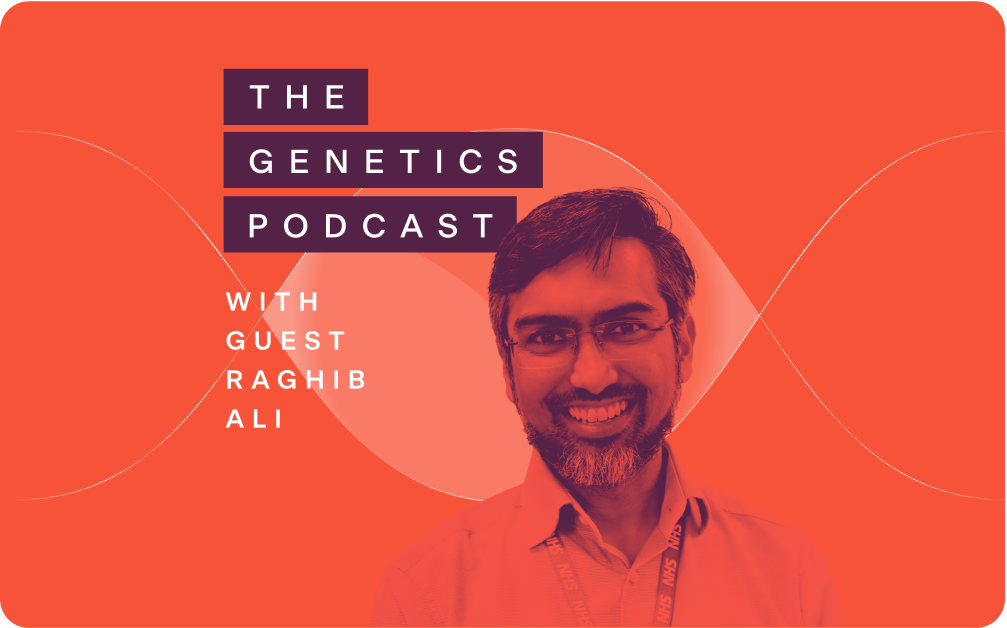Podcast recap: Dr. Raghib Ali on Our Future Health and large-scale genetic research

In the latest episode of The Genetics Podcast, Patrick spoke with Dr. Raghib Ali, CEO and CMO of Our Future Health (OFH), a UK initiative aimed at recruiting 5 million participants for large-scale genetic and health data research. This ambitious program, launched in partnership with the NHS, seeks to improve early disease detection and prevention by integrating genetic, lifestyle, and environmental data. You can find out more about Our Future Health here.
Building a new model for healthcare
Dr. Ali kicked off the discussion by emphasizing how the reactive nature of traditional healthcare is a fundamental problem. Our Future Health aims to change that by identifying high-risk individuals much earlier than usual, making prevention and early intervention possible. The project is currently centered on common chronic diseases like cardiovascular disease, diabetes, and cancer, with the goal of improving risk prediction and moving beyond outdated, age-based screening models. With a planned 5 million participants, the program has the potential to dramatically enhance our current healthcare system, making proactive precision medicine a reality for millions.
1 million participants and counting
Our Future Health recently reached a major milestone—over 1 million participants have now contributed blood samples for analysis. The speed of recruitment has been unprecedented, thanks to a strategic approach that includes setting up collection sites in shopping centers, mobile units, and community pharmacies. This focus on accessibility has made participation easier and helped bring in a much more diverse group of volunteers than in previous studies. So far, nearly 2.2 million people have signed up, with more than 1.3 million blood samples collected, bringing the program closer to its goal of transforming early disease detection and prevention.
Recruiting a more representative cohort
A key priority for Our Future Health is ensuring diversity among participants—something that has been a challenge in past large-scale studies. So far, about 10% of participants come from underrepresented ethnic groups, and another 10% represent UK residents of lower socioeconomic status. This broader representation is essential for understanding how genetic, lifestyle, and environmental factors interact across different populations, ultimately leading to more inclusive and effective approaches to disease prevention and treatment.
Returning results to participants and working with the NHS
Our Future Health is taking a different approach than more traditional observational sutides by returning genetic risk information to participants. This creates opportunities for early detection and prevention but also comes with challenges, especially when it comes to integrating this information into the healthcare system without adding strain. To manage this, OFH is working closely with the NHS to explore where genetic information can better existing screening and prevention programs, such as those for cardiovascular disease and diabetes, ultimately aiming to improve long-term health outcomes.
The future of genetic research
Our Future Health is built on a public-private partnership, combining government funding, NHS collaboration, and industry support to drive innovation in genetic research. By bringing together expertise from academia, biotech, and pharmaceutical companies, the program not only accelerates our understanding of conditions but also ensures that research translates into real-world healthcare improvements. With over £300 million in funding, equally split between government and industry, this collaborative model is making large-scale genetic research more accessible and impactful.
Looking ahead, OFH plans to expand recruitment, return more health insights to participants, and launch clinical trials focused on prevention. The ultimate goal is to shift healthcare from a reactive model to one centered on early detection and intervention, paving the way for a future where chronic diseases can be predicted, prevented, and better managed on a national scale.
Listen to the full episode:
